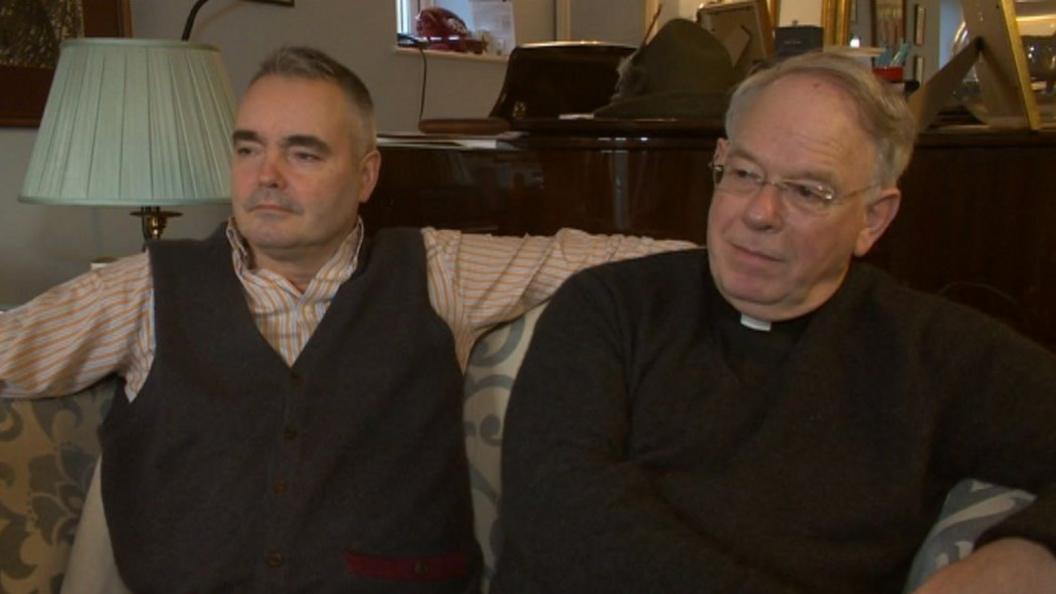Civil partnerships: Ten years on
- Published
Percy Steven and Roger Lockyer, and Whitney Bacon and Megan Evans talk about what their civil partnerships mean to them
On 19 December 2005, the UK's first civil partnerships took place.
In the 10 years that have followed, nearly 140,000 people have entered into one, while more than 9,000 same-sex couples have since married.
Two couples whose lives were changed by civil partnerships describe what it meant to them.
When Percy and Roger met on a blind date in 1966 homosexuality was still illegal.
As an actor and an academic in their 20s and 30s, the image of "Swinging London" and its sexual liberation was largely a myth.
They lived their lives in private with sympathetic friends, or in "sub rosa" nightclubs where you gave a false name and kept one eye on the exit in case of a raid.
Burglaries at their home went unreported for fear the authorities would be more interested in their relationship. At any one moment they risked arrest, prosecution and jail for falling in love with the wrong person.
'A full citizen'
"We were young and it was exciting in a way and almost an adventure," Roger Lockyer, 88, a former history professor at Royal Holloway, University of London, told the BBC.
"But looking back at it from now one realises that potentially it could be awful. The subject of homosexuality was really taboo it was so awful that you couldn't discuss it with anybody."
Nearly 50 years later, the couple, whose relationship spans many significant stages of gay liberation, are celebrating the 10th anniversary of their civil partnership.
They made history by becoming one of the first same-sex couples in the UK to say "I do", external in a legally-recognised ceremony.
Last year, they converted their civil partnership into a marriage.
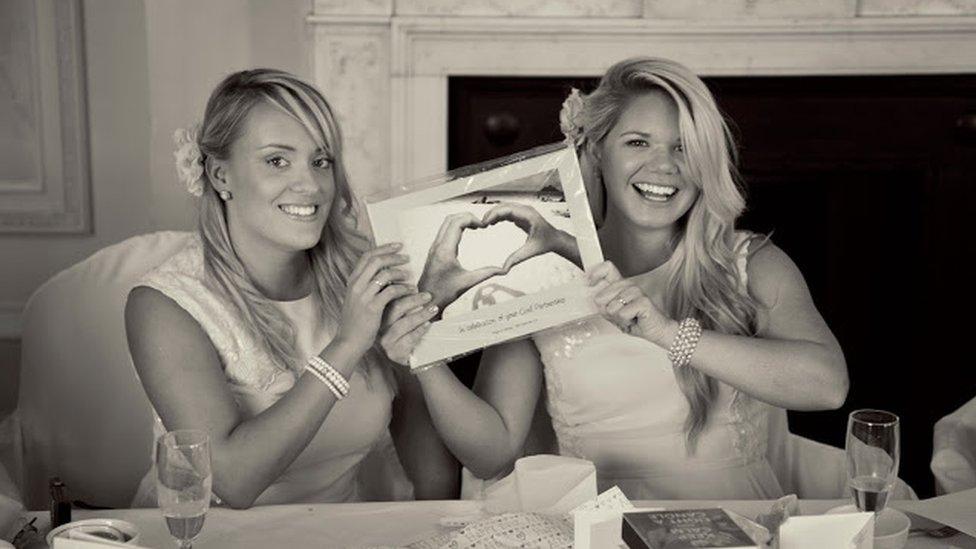
Megan Evans and Whitney Bacon blog about their relationship
Sitting in the book-lined Marylebone home he shares with his 76-year-old husband Percy Steven, Roger said: "I remember distinctly walking down the street after the ceremony thinking, 'I am as legal a person as anybody else, I am a full citizen at last'.
"I never believed that moment would come. I thought 'good God is this a fantasy?'"
Their ceremony captured the imagination of the world, and interviews were broadcasted on UK, US, Australian, French, German and Italian television.
Roger added: "I think it was a revelation for the government, who thought a few couples might sneak out of the woodwork, and there was almost a flood; a great number of people asserting their rights after living in the shadows for as long as half a century."
The passing of the Civil Partnership Act 10 years ago this week - with cross-party support in Parliament - marked a sea-change in gay rights.

Gay rights landmarks
1967 - Private homosexual acts between men aged over 21 decriminalised in England and Wales
1980 - Homosexuality decriminalised in Scotland, then in Northern Ireland in 1982, and in the Isle of Man in 1992
1994 - Age of consent for gay men lowered from 21 to 18. It was lowered to 16 in 2001
2000 - Ban on openly gay members of the armed forces lifted
2005 - Civil partnerships come into effect in the UK
2014 - Same-sex marriage laws come into effect in England, Wales and Scotland
2015 - Republic of Ireland votes to legalise same-sex marriage

Across the UK, hundreds of gay and lesbian couples were granted many of the same legal and civil rights as married heterosexuals, albeit with a few outstanding differences around issues such as pensions in the private sector.
Couples could no longer be kept out of hospital rooms where their partner lay dying. They would no longer lose their home or business because of unjust tax laws and they had parental rights over children.
By 2015, more than 138,000 people had a civil partnership - with more than 18,000 people joining their hands in marriage since the Marriage (Same Sex Couples) Act 2013 came into force in England and Wales in March 2014 and in Scotland in December of that year.
Last month, two gay couples in Northern Ireland took the Stormont administration to the High Court, claiming the ban against gay marriage breached their human rights.
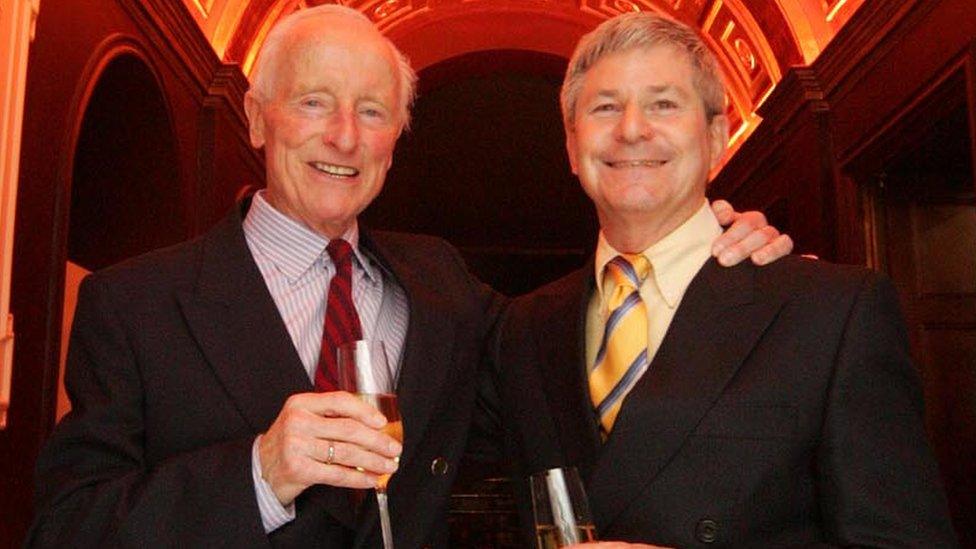
Roger Lockyer said he had to hide his relationship with Percy Steven
Ben Summerskill, former chief executive of the group Stonewall, said civil partnerships were a vital "test run" that paved the way for many of the gay rights granted in the last decade, including those around fertility treatments and adoption, as well as marriage.
"We shouldn't forget, it was a pretty tough battle at the time," he said.
"Great swathes of the House of Commons and House of Lords were doggedly opposed to civil partnerships. The Church of England was doggedly opposed to civil partnerships.
"I think probably David Cameron would not have been persuaded to be quite so radical if he hadn't seen ages earlier that this had been introduced and the sky hadn't fallen in.
"The world for young LGBT people has changed transformatively in a generation."
'Live happily ever after'
Two of those young people are Megan Evans and Whitney Bacon, who run a blog and post on YouTube, external, with 40,000 subscribers.
Their relationship - and subsequent civil partnership - has made them into online role models for young gay women around the world.
But when they met on social media site MySpace in 2006 they were more than 7,000 miles apart in the UK and the US.
Megan, 28, a gay rights activist who works in HR in Windsor, Berkshire, said: "I set our blog up in 2009 called What Wegan Did Next, because we're 'Whitney and Megan - Wegan' - one of our friends gave us that name a few years ago and it's just stuck.
"Initially I just wanted to document our long-distance relationship and also put ourselves out there as a feminine lesbian couple and that we're proud to be gay."
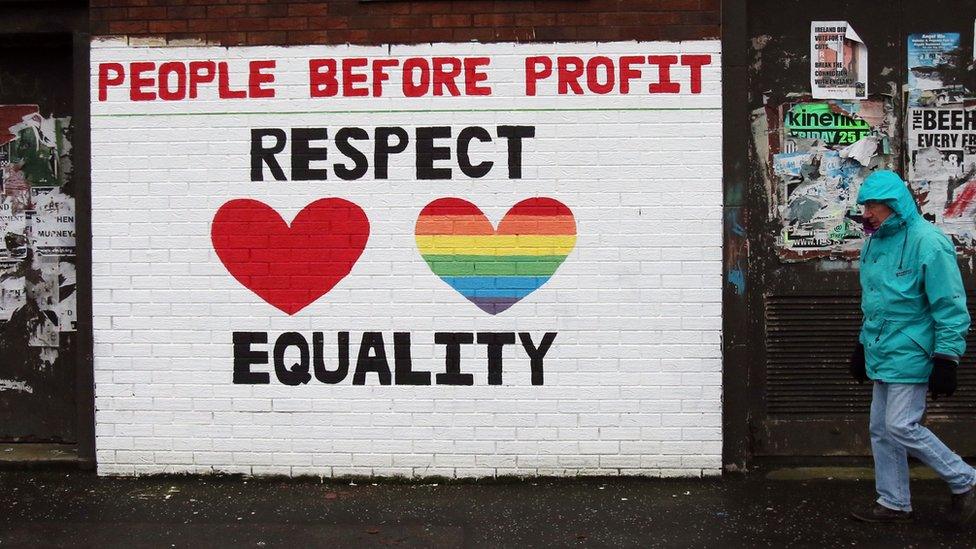
Two couples in Northern Ireland took the Stormont administration to the High Court over gay marriage
She added: "I couldn't live in America with Whitney because gay marriage wasn't legalised then. And for four years every time I went back home to the UK without her, it was really sad.
"I think I always hoped that equality would catch up and that by the time I was able to get engaged and get married that it would be legal - and luckily enough it was."
They had a small civil partnership ceremony in a register office in Windsor in September 2012, followed by a champagne tea with family and friends.
Thanks to their legally-recognised union - bolstered by years of YouTube footage and blog posts - Whitney's visa was finally approved and the pair moved into a cottage in Windsor.
They are planning to convert to a marriage in 2017 and have children.
Whitney, 27, who grew up in Kentucky, added: "When I was young I always had this vision of meeting this amazing, blonde, beautiful girl with a nice British accent, but I never thought it would become a reality.
"It was amazing to know that I could have a civil partnership, which is pretty close to a marriage and it would also pave the way for me to move to the UK for she and I to live happily ever after.
"If it wasn't for that who knows where we would be."
- Published19 December 2015
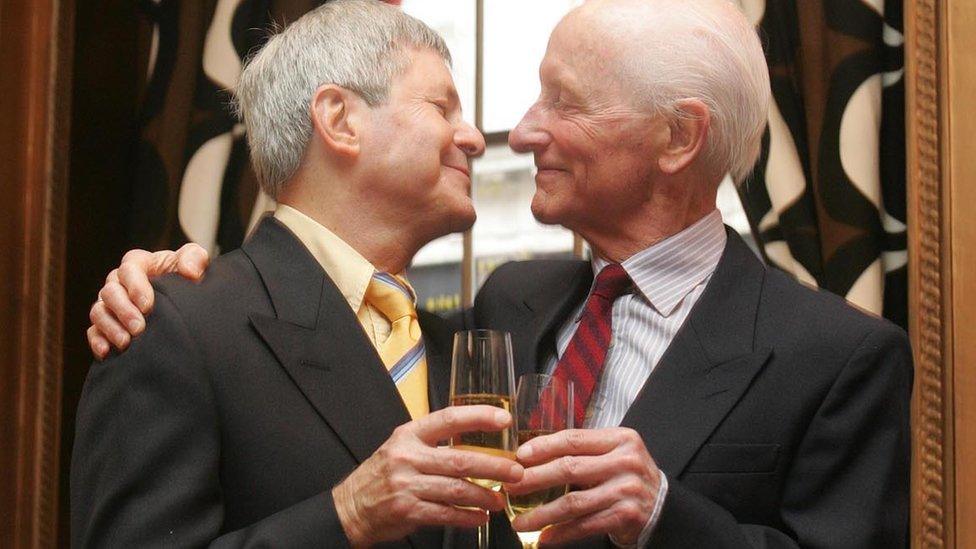
- Published13 December 2015
